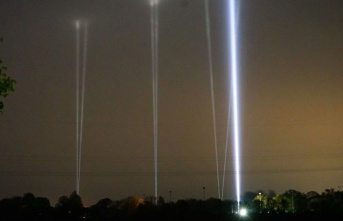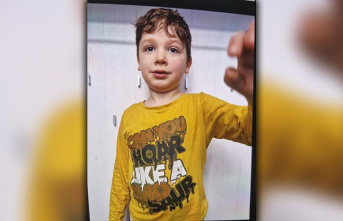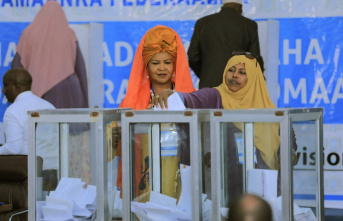I work both on the political and the security side,” says Mark Galeotti, a Slavist and member of the Royal United Services Institute (RUSI) think tank in London. The author of several books, Captain Swing is now publishing A Brief History of Russia and We Need to Talk About Putin: Why the West is Wrong About the Russian President, an analysis of the figure of the head of the Kremlin not without British humor to which he has added a “ coda” about the war in Ukraine, which he says “may last for months, if not years”.
Why has the Russian military performed so poorly?
Partly it is due to the strength and skill of the Ukrainians: they have been preparing for this war for eight years in some way. And part of it is because of problems in the Russian military, corruption, poor maintenance, that sort of thing. But I can't help but believe that the only main reason is the extraordinarily poorly managed initial strategy, which I believe was Putin's own decision. The Russians lost much of the momentum and many of their best troops.
Does the cruelty shown in Bucha have an explanation?
I have spoken with psychologists who have worked with soldiers in places like the Balkans. These soldiers were terrified. When they entered, they were told that they would be greeted with bread and salt by happy, smiling Ukrainians, glad to have been freed from the neo-Nazis. They get angry, they feel betrayed. And remember: Russians and Ukrainians see themselves as part of a kind of family. And disputes within the family can be much more bitter than disputes with people you don't know. A psychologist told me that the worst thing is lack of sleep. People who haven't slept in three days begin to lose their grip on reality. And I think, in a way, it was that terrible combination of poor discipline, minimal control from above, and a pretty brutal military culture.
Who runs the war?
General Dvornikov is in charge and receives his orders from the Chief of Staff and the Defense Minister. However, it is clear that Putin still has a lot of control over the details of the war.
And is there an explanation that at least six Russian generals have died on the front?
Well, the Russians have a tradition of having their generals much closer to the front lines than we would expect in a Western army. And that happens all the more when things are confusing. The Russian military still relies heavily on generals; they do jobs that in a western army colonels would be doing. Still, it is significant that there have been so many deaths.
A NATO army is more flexible, small units have more decision-making power...
That is one of the keys, absolutely. The Russians have tried to get better at this but they still don't have the culture of letting officers do their job, they still have to consult up the chain of command.
Most of the information we have about the war comes from British intelligence or the British Army, which helps the Ukrainians. When did this cooperation start?
It takes years. There has been quite close cooperation. There was Operation Orbital, which was a training operation in which the British provided military hardware but also advice and guidance. Before the war started there were already some pretty close connections between the Ukrainian military and security structures and their British counterparts.
Days before the invasion, Gleb Pavlovsky said that Putin had an inexplicable obsession with the Donbass. What is the impression of him?
It has always been about Ukraine as a whole. And the Donbass was always a lever, a way of trying to put pressure on Ukraine. Putin wants some kind of great historical legacy, to be the tsar who managed to bring Belarus and Ukraine back into the Russian family from the Slavic world. And I think for years he believed that he could do that through political and economic influence. What we see now is a quite different Putin from the one I described in my book. Not quite, but you could say that he almost went to the next stage and became even more Putin. The cautious Putin we saw two years ago looks more like an angry old man in a hurry. The macho image of him is disappearing, he looks a bit bloated and aged. He is now taking risks that he would not have taken in the past.
There is a theory that he is very ill. But he is not really old, he is 69 years old.
It's not old at all. But he may look like it. There's a line of speculation that he might have decided that he doesn't want to stay in power. Let's speculate. Let's say that his bet on the Ukraine would have worked, that he would have been able to take control as he had planned. It's that kind of big win that gives you a chance to quit in a moment of glory. And that is not happening. I have been watching Putin since before he was president, and the one we have seen lately is a very different figure. He has much less control over his body, over his emotions. He communicates a very different kind of personality.
With the West he plays the role of the madman. I don't think he is, but the question is whether, as we tend to think, he is that dangerous...
I agree that he is not crazy. Many of his recent hints about using the nuclear weapon are designed to scare us. I really don't believe them. But we have to think to what extent even sensible and pragmatic people can do very dangerous and foolish things. Putin has isolated himself from reality. He is surrounded by people who share his own assumptions or who tell him not what he needs to hear but what he wants to hear. Russia has excellent intelligence on Ukraine, not that they had no idea what was going on across the border. But nobody could or dared to tell him: look, boss, I'm sorry, but things are not like that.
Is there any chance of a coup in Moscow?
No. For the moment at least. Is Putinism Dying? I think that Putinism is already dead. Putin killed him when he invaded Ukraine. The long-term political and economic impact on Russia will totally discredit Putin's model. And all the benefits of Putinism, which, we must recognize, in his first two presidential terms were very successful, are being burned by the effects of this war. But in terms of a coup… Putin has created a system in which he is surrounded by ruthless pragmatic opportunists, and the risks of doing anything are far greater than keeping his head down. And there's still a kind of very effective balance of terror where you have the military, the National Guard, the FSB, the presidential security service, all these agencies keeping tabs on each other. It will be very, very difficult to hit. I don't see any signal right now. I think the coup is not the way this system will end.
4












